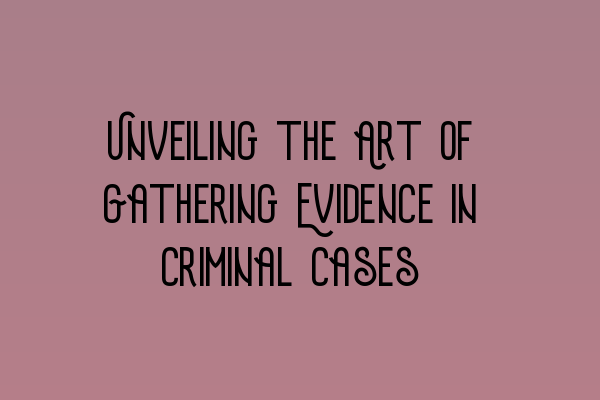Unveiling the Art of Gathering Evidence in Criminal Cases
When it comes to criminal cases, gathering evidence is a crucial step in ensuring a fair and just outcome. Evidence plays a fundamental role in establishing the guilt or innocence of a defendant. As solicitors, it is our responsibility to meticulously collect and organize evidence that will support our client’s case and present a compelling argument in court.
To successfully gather evidence, we must employ a variety of strategies and techniques. In this article, we will unveil the art of gathering evidence in criminal cases, providing valuable insights into the process and highlighting key considerations.
The Importance of Expert Testimonies
Expert testimonies are a powerful tool in building strong cases. They provide specialized knowledge and insights that can greatly influence the outcome of a trial. It is essential to identify and engage experts in relevant fields who can provide credible and reliable testimony.
For further guidance on the role of expert testimonies, check out our article on expert testimonies.
The Role of Forensic Evidence
Forensic evidence can be instrumental in criminal cases, often serving as the deciding factor in determining guilt or innocence. DNA analysis, fingerprint identification, and ballistics examination are just a few examples of forensic techniques that can provide crucial evidence.
For a comprehensive understanding of forensic evidence and its importance in criminal cases, we recommend reading our article on SQE exam prep.
Documentary Evidence and Digital Forensics
Documentary evidence, such as contracts, emails, or financial records, can often unveil valuable information that can make or break a case. It is vital to meticulously gather, review, and analyze all relevant documents to uncover any inconsistencies or crucial details.
With the increasing reliance on digital communication, digital forensics has become an essential aspect of gathering evidence. The examination of electronic devices, social media accounts, and online activities can provide valuable insights into a defendant’s actions and intentions.
To delve deeper into digital forensics and its relevance in criminal cases, make sure to read our article on demystifying the Solicitors Qualifying Examination format.
Witness Statements and Testimony
Witness statements and testimonies can significantly impact the outcome of a criminal case. It is crucial to interview witnesses thoroughly and extract accurate and reliable information that can support our client’s position.
For international lawyers preparing for the SQE exam, we have compiled a valuable resource that offers insights into the challenges and success strategies of the SQE exam for international lawyers.
Legal Considerations and Challenges
Gathering evidence in criminal cases comes with its own set of legal considerations and challenges. Adhering to proper legal procedures, ensuring the admissibility of evidence, and correctly documenting the chain of custody are vital steps to guarantee the evidentiary integrity.
To assist UK entrepreneurs in forming a limited liability company (LLC), we have prepared a step-by-step guide that simplifies the process. Check out our article on LLC formation made simple to get started.
In Conclusion
The art of gathering evidence in criminal cases requires a comprehensive approach, employing a variety of techniques to uncover and present strong evidence. Through the utilization of expert testimonies, forensic evidence, documentary evidence, and witness statements, we can build compelling cases that stand up in court.
For aspiring solicitors, it is essential to familiarize yourself with key concepts and study materials for the Solicitors Qualifying Examination. Our article on SQE exam prep provides valuable insights into essential study materials.
